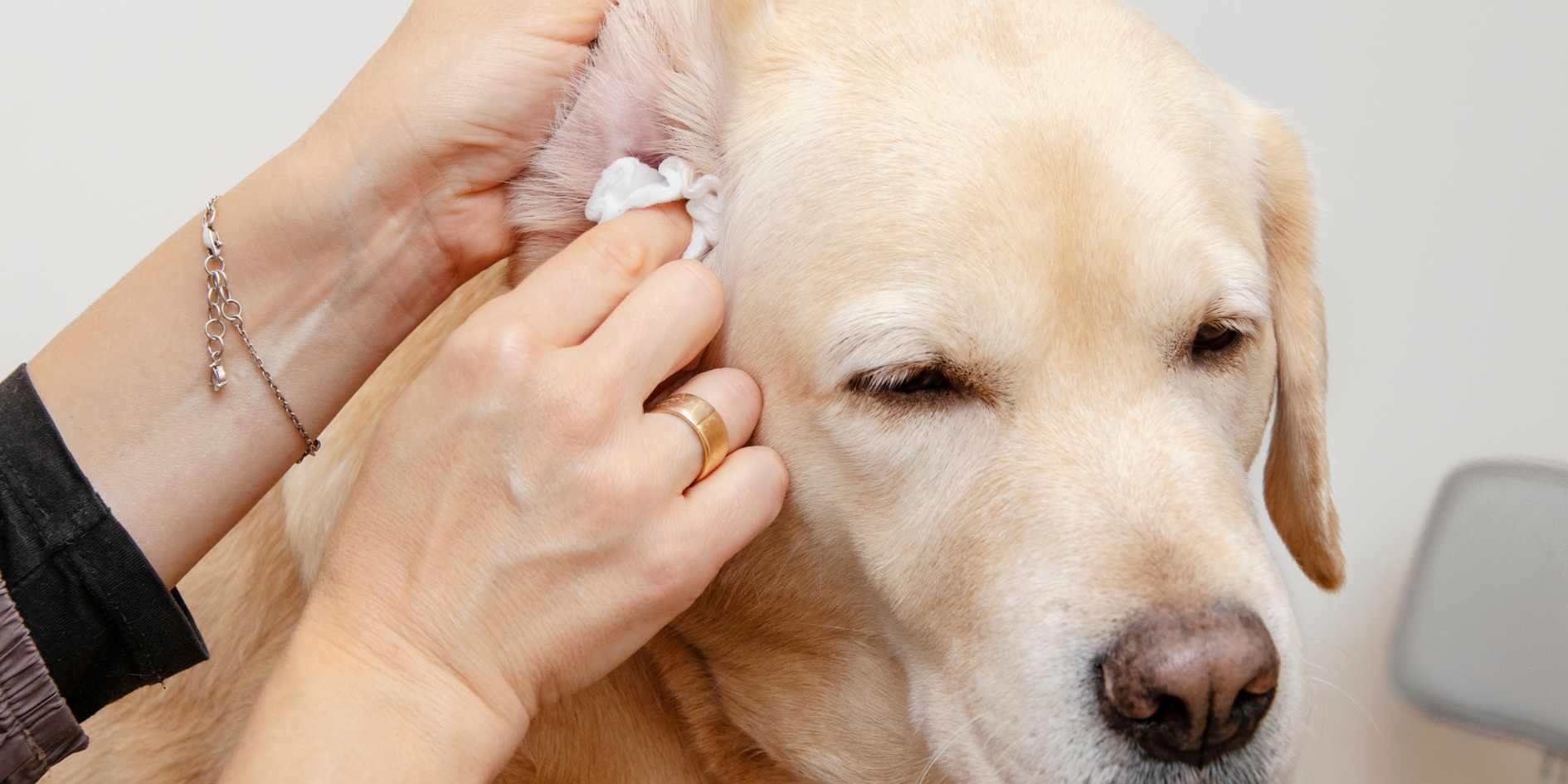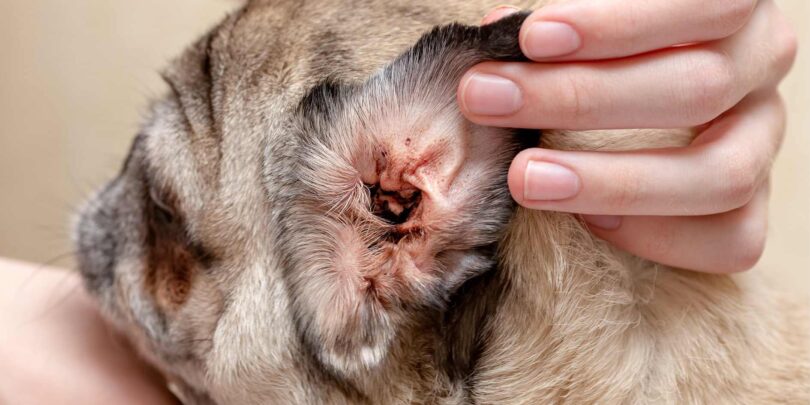Ear mites are an infection found in dogs particularly in the puppies and dogs that spend most of their time outside or with other pets. These small parasites may bring about discomfort, itch and may lead to some form of infection. Although a trip to the vet is always the most appropriate and definite diagnosis, there are many home treatment methods that can be used to alleviate symptoms of your dog to help it recover.
This paper will take you through all that you should know about home treatment of ear mite in dogs including the symptoms and causes in addition to natural remedies and preventative treatment.
What Are Ear Mites?
Ear mites are spider-like small parasites found in the ear canal of dogs and other animals. Otodectes cynotis is the most prevalent type seen in dogs. These mites live on the wax, oils and skin debris and result in very severe irritation to the ears.
How Do Dogs Get Ear Mites?
Dogs typically become infected with ear mites by direct contact with an infected animal, including cats, other dogs, or wildlife. These parasites may also breed in places such as dog parks, kennels, and shelters. Puppies are particularly susceptible as they have immunity that is still developing.
Signs and Symptoms of Ear Mites in Dogs
You need to be aware of the symptoms as soon as possible to begin treatment immediately.
Common signs of ear mites in dogs include:
- Too much scratching of the ears or shaking of the head.
- Coffee-ground discharge in the ears, which is dark.
- Redness or inflammation within the ear channel.
- An unpleasant smell in the ears.
- The crusting or scabs on the outer ear.
- Agitation or symptoms of unease.
Ear mites are one possible cause of these symptoms- but other types of conditions such as yeast infections and allergies can also resemble them. Even when you intend to treat at home, a visit to the vet so that he can do a proper diagnosis is advised.
Is Home Treatment Safe and Effective for Dog Ear Mites?

It is true that home treatment can work, particularly in mild cases or supplement to veterinary care.
However, keep in mind:
- The ears have to be cleansed before any treatment.
- The formula required to kill mites and their eggs is consistency and follow-through.
- A vet should consider severe or recurring cases.
Step-by-Step Guide to Home Treatment
We shall discuss the best home remedies and treatment procedures of ear mites in dogs.
Clean the Ears Thoroughly
There is need to clean the ears of your dog before using any medication or home remedy.
Here’s how:
Supplies Needed:
- Cotton balls or gauze (do not use Q-tips)
- Ear cleaner that is safe to use on a dog (either purchased in a pet store or homemade)
- A towel (to prevent mess)
Optional Homemade Ear Cleaner:
As a gentle ear rinse, mix water and apple cider vinegar, in equal quantities. not in a red ear, or one which bleeds, or has open sores–stings.
How to Clean:
- Use your finger to raise the ear flap of your dog.
- Put a little ear cleaner in the ear canal.
- Massage the bottom of ear with fingers, 20-30 seconds.
- Let your dog shake their head.
- Clean up debris and liquid with cotton ball or gauze.
Ear cleaning 1-2 times a week during treatment can help remove debris and mites, and can help treatments to be more effective.
Apply Natural Remedies
a) Mineral Oil or Baby Oil
When regularly used these oils deaden and suffocate ear mites.
How to Use:
- Apply a little bit of warm (not hot) mineral oil or baby oil in each ear.
- Massage gently.
- Have your dog shake his head, and then wipe him off.
- Repeat daily for 7-10 days.
b) Olive Oil
Olive oil can also be used like a mineral oil, and can sometimes be used to soften wax and debris.
How to Use:
- Warm the olive oil slightly.
- Put 3-5 drops into each ear.
- Massage the ear base gently.
- Wipe away any remaining oil.
c) Aloe Vera
Aloe vera gel in its purest form is also beneficial to calm inflamed mite-bite-affected skin.
How to Use:
- Put some pure aloe vera (no additives) on the outer ear.
- Do not go too deep in the ear canal.
- Take one time a day when treating.
d) Green Tea Rinse
Green tea is a natural antiseptic and may be used to clear the mites.
How to Use:
- Make a cup of green tea in hot water and allow this to cool down.
- Rinse the ears using the tea with a dropper or syringe.
- Repeat once a day for 7 days.
Over-the-Counter Ear Mite Treatments
When you need a ready-made remedy, there are a number of ear mite treatments on the market in pet shops or online.
Find products with:
- Pyrethrins (an insecticide of natural origin)
- Salicylic acid (aid in removal of rubbish)
- Natural oils such as tea tree (in minute amounts always ensure safety to the dog)
Note: Be careful to read the label, and never apply to your dog products designed to be used on cats or other animals.
Treat the Environment
Ear mites may be transmitted rapidly between pets and remain in the environment.
To minimize reinfestation, do the following:
- Wash the bedding of your dog in hot water once a week.
- Clean collars, leashes and toys with pet-safe disinfectant.
- Clean floors and furniture working regularly.
- Other pets in the house should be treated even when they have no symptoms.
How Long Does Treatment Take?
Ear mites are typically killed within 7-10 days of regular home treatment. The treatments, however, may have to continue as long as 3 weeks to get rid of eggs completely and prevent recurrence.
Monitor your dog with persistent symptoms of scratching or discharge. In case the symptoms do not disappear after 2 weeks, then talk to you veterinarian.
When to See a Vet
Home remedies do work but there are times when professional care is necessary.
Contact your vet if:
- Symptoms in your dog do not improve or get worse after 10-14 days.
- The ears have a strong and unpleasant Odor.
- You observe pus, hemorrhage, or undue swellings.
- Your dog seems to be in a lot of pain.
- Your dog has a different medical problem or is taking medicine.
In the case of a secondary infection, your vet can prescribe more potent antiparasitic ear drops, oral medications or antibiotics.
Preventing Future Ear Mite Infestations
Treatment is not more important than prevention, here are few easy ideas on how to keep your dog ear-mite free:
Regular Ear Checks
Check your dog ears once a week to look at them as red, dirty or smelly.
Keep Ears Dry and Clean
Humidity and grease formation provide an ideal condition of mites and infections. Clean your ears with a veterinarian-approved ear cleaner.
Limit Contact with Infected Animals
Do not allow your dog to play with any pets that you know have ear mites, or pets that display evidence of ear infections.
Maintain a Clean-Living Environment
Wash bedding and wash toys. Have your house cleaned and disinfected.
Routine Vet Visits
Wellness checkups can help identify issues early in life such as ear mite infestation before it becomes severe.










Leave a Comment